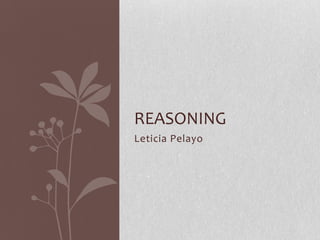
Reasoning
- 2. Reasoning •The process of creating or generating conclusions from evidence or premises.
- 3. Deductive Reasoning • The process of reasoning from general statements to a certain and logical conclusion related to the conclusion. • There are three parts to deductive reasoning: • Major Premise – general statement • Minor Premise – statement of a specific instance related to the major premise • Conclusion – statement derived from the minor premises relationship to the major premise.
- 4. Inductive Reasoning • The process of reasoning from specifics to a general conclusion related to those specifics • Inductive reasoning allows humans to create generalizations about people, events, and things in their environment.
- 5. Inductive Reasoning • There are five ways of inductive reasoning • Example Reasoning • Causal Reasoning • Sign Reasoning • Comparison Reasoning • Reasoning from authority
- 6. Example Reasoning • Uses specific instances as a basis for making a valid conclusion. • For example, I have taken four good teachers at this college; therefore, all teachers at this college are good.
- 7. Causal Reasoning • It is based on the idea that for every action there is a reaction. • There are two forms of causal reasoning: • Cause to effect • Effects to cause
- 8. Casual Reasoning • Cause to effect – a known cause or causes is capable of producing some unknown effect or effects. • Effect to cause – some known effect(s) has/have been produced by some unknown cause, or causes. • For example, the professors at this college are good because they all have at least a Master’s Degree in their teaching field.
- 9. Sign Reasoning • It involves inferring a connection between two related things, so that presence or absence of one indicates the presence or absence of the other. • For example, football on television is a sign that Fall has arrived.
- 10. Comparison Reasoning • It involves drawing comparisons between two similar things, and concluding that, because of the similarities involved, what is correct about one is also correct of the other. • It is also known as reasoning by analogy. • There are two types of comparison reasoning: • Figurative Comparison • Literal Comparison
- 11. Comparison Reasoning • Figurative Comparison – the attempt to link similarities between two cases from different classifications. • Literal Comparison – the attempt to establish a link between similar classifications. • For example, people to people, cars to cars, and states to states.
- 12. Reasoning From Authority • It is used when a person argues that a particular claim is justified because it is held or advocated by a credible source. • You can use this type of argument in two ways. • You can ask that an argument be accepted simply because someone you consider an authority advocates it. • You can support your arguments with the credibility of another person.
- 13. Fallacy • Is an error in reasoning. • An “argument” in which the premises given for the conclusion do not provide the needed degree of support.